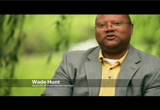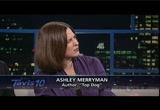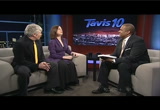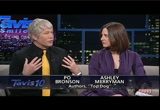tv Tavis Smiley PBS March 16, 2013 12:00am-12:30am PDT
12:00 am
tavis: good evening. from los angeles, i am tavis smiley. tonight, the conversation with the authors of a new book, "top dog," about winning and losing and about getting and in a very competitive world. the author is give game changing steps. this is for everyone including students in classrooms. we are glad you could join us about the science of winning and losing, coming up right now. >> there is a saying that dr. always the right time to do the right thing. i just try to live my life every day by doing the right thing. we know that we are only about halfway to completely eliminate hunger, and we have a lot of work to do. walmart committed $2 billion to fighting hunger in the u.s.
12:01 am
as we work together, we can stamp hunger out. >> and by contributions to your pbs station from viewers like you. thank you. >> -- tavis the title pretty much says it all. "top dog: the science of winning and losing." cooperation is always better than competition, that risk is better than assessing risk. they also a lot to say about the way men and women approach
12:02 am
competition, how kids are set up to fail as adults by the way they handle stress in school, and a training ground for how to succeed. lots to get to, which i can promise you we will not get to all of that in 30 minutes. it is such a provocative attacks. police now you know what is in it, so you can run out and get it. and ashley merryman. that pretty much it talks about this. let me start with some of the issues just raised in the introduction about the notions of conventional wisdom that cooperation is always better than competition. >> you know, even if you go all of the way down to the hormone level, the hormone that is most symbolic in competition is testosterone. scholars bring women into the laboratory and have them play money games where they steal with their opponent or share
12:03 am
with their upon it, right? and they give them either testosterone or a placebo. the women you plate selfishly assumed they had been given testosterone. they were given a placebo. the women who played cooperatively had been given testosterone. most of us in our daily life to the extent we have to compete with the rat race and the world, we are collaborating with other people at the same time. the two are hand in hand. tavis: is competition overrated or underrated? >> i think that is a great question. i think it depends on the context. michael phelps, great. the country needs to be more competitive. we have no problem with that. as a basketball team. but with people, to know
12:04 am
somebody really competitive in board games, that is the dilemma. we are wondering when it comes to people, this competition mean you have to sacrifice integrity? doesn't mean you have to be cut through or take out even your best friend? but great competitors do not have that dilemma. they respect their opponents, realize i do not have to win at all costs, because there is another competition coming up, and i want to learn and improve. tavis: how do you explain that over time, competition has gotten such a bad rap. >> we were talking about people in the self-esteem movement. in competition, if there is a winner, there is a loser, and we do not want people to feel like losers. it is about making a mistake, being bested won it, but then learning. it is about having this
12:05 am
challenges and then moving forward. it is not about making people winners or losers. competition challenges you to be the best that you can. tavis: is it worth having a conversation about what it is meant by winning and losing? when the book first came across my desk, counterintuitive, what do we mean by winning, and what do we mean by losing? >> the title is meant to be provocative. covering competition, we want to evoke the idea that you might lose. so when we compete, in the right circumstances, if you and i were to compete, we would both bring our best, and we push each other to do more than we could just through drive an intrinsic motivation alone. i can push myself, and you can push yourself, but competing, when push ourselves a little more, and we are at our best, even if one wins and the other
12:06 am
news is. we both get better, not that one does. that means we have great respect for the opponents, whether we win or whether we lose. we get used to the fact that competing -- and to news does not mean it kills you. it just makes you stronger. people that we call maladaptive. tavis: we will come back to that. >> my feeling, my premise would be that people that have that have not lost enough. they are scared of losing, and they did not have enough losing experiences in their formative years to understand that you can maintain your integrity, lose, and come back. tavis: explain the difference between adaptive competition and maladaptive competition. >> so adaptive competition, will recall being a true competitor, you bring it all because you still have respect for the rules
12:07 am
and for those who enforce them, your opponent, and you would never think of crossing that line. you are willing to try to lose or win and bring out your best. maladaptive competitiveness means that person cannot turn that instinct off. a person that has to win at everything, not just the things that he or she feels greatly about. not just to compete hard but to selectively compete, to harness your energy for the things that matter, and in some cases to realize it does not matter whether i win or lose here at all. a surgeon might be -- might want to be the best surgeon he can be but will not care how he is on the weekend in long island on the ping-pong table. recognizing the social circumstance. this is a crucial competitive skill. tavis: the media, and when i say
12:08 am
that, i mean madison avenue. the guys responsible for this notion that if you lose, you are a loser, and that the winner takes all means all. who cares about second place? to what level is society responsible for what we think about with winning and losing? >> i do sort of think there is a zero sum. look at politics right now, congress. we cannot give anything because to give anything means we are the loser. that zero some mentality encourages people cheating, going for broke, because they do not feel -- we were writing a piece a few days ago about kids studying for the s.a.t.. that is a zero sum game. you get into harvard, or you do not. you do not come out and say, "i learned a lot." it is about getting into that
12:09 am
grade school or getting that great job. tavis: is that unique, we are talking about here, is this unique to american culture, or are there societies around the globe that view collaboration and competition differently? is this uniquely american? >> it is not uniquely american, but we are perhaps most pronounced in our celebration of winners and disregard for losers. and there is a counterculture when it comes to kids. i live in san francisco and help manage youth soccer for kids. there was a movement that came out of the self-esteem movement. nobody keep track of the goals, because we do not want the kids to have an experience of losing, thinking that its guard them to lose, we made missing so taboo, -- thinking that it scarred
12:10 am
them. it makes it more scary, not less scary. tavis: all of this sequestration mess of late. what would be most useful for members of congress on the left and the rights? stuck in what seems to be this hopeless dysfunction, what is the best takeaway about how to navigate the challenges that they face on behalf of the american people? >> i think it is exactly not looking at every vote as a zero sum game, that it is fatal to their political career and to their party. how can we make this particular bill or issue better? not actually be thinking about the winners or the losers. just looking at the substance of it, getting what you think is the best thing, but realizing there is not going to be -- real life is not winner-take-all. we all have wins.
12:11 am
i think that would be the best thing for congress right now. tavis: there are some other great to sting cringed -- distinctions that i am jumping to in different areas. the difference between warriors and worriers. >> it has gotten a nickname, the warrior-worrier gene. one-quarter of people have worrier only jeans, and one- quarter of warrior only jeans, and some have half and half. the net result is some people do their best without any stress on them, and they actually have a
12:12 am
10-point cognitive iq advantage without stress, but under stress, their brains start to melt down. other people on a day-to-day basis do not really get up for it without some pressure or stretch. -- stress. they need performance deadlines and bright lights on them in order for their break to function its best and to think clearly. the first group were the warriors. the second group is the warriors. it sounds like the second group is the best. -- the first group was the warrior -- worrier. planning for the future, to strategizing. i was just say the other day that the secretary of state should be able to think far into the future in anticipate every strategic possibility. it is not bad to be a worrier or
12:13 am
better to be a warrior. it is two different skills. tavis: i was thinking when i read that text, i would have loved when i hired all of these people -- you know where i am going with this. i would love to have known at the interview who had which, because in a company that is dynamic, you need all of that, but it would help so much more to know who to put in which slot, who does better under pressure, who does better without the stress. i do not think it is better or worse, winner or loser, but will there ever come a time when we have that information available? >> the thing is, you do not want to write people off. tavis: you are not writing them
12:14 am
off. there are navy seal worriers. the person who has the worrier gene may be more susceptible to stress, but over time, they can get used to a particular situation, so someone after the beginning, after they have had a few meetings, "oh, i can get this." then there are natural memory advantages. those are coming back in kicking in for them. tavis: all right, so we talked earlier about the difference between men and women. what they have discovered about the science of winning and losing. >> we did not want to touch this. we did not want to go near this. >> no. >> as science journalists. tavis: as television hosts, we love this. men and women, black and white, we love it.
12:15 am
>> but it is on now. the differences of competitive spirit is quite pronounced in the science. it is not true for every man or everywoman. tavis: why did you not want to go there it? why did you hesitate to take this on in this text? >> i was told as a woman, working in the clinton administration, my boss was a woman, and there was a book about us not being competitors. i am a lawyer. everybody i know you're is competitive. it also fell to me like one more step of "you should not to compete." or, "we do not need to include you?" what the science was saying, women are not as competitive.
12:16 am
once we got past that, ok, i think we need to talk about that. tavis: so you weren't worried about fallout or pushback? >> literally, i was distrustful. our last was on child development, and other journalists played a slight, a tiny differences between boys and girls. they are from mars, girls are from venus, sort of thing. the gaps or small. but they were not small. in competition, write. the clearest gap was the last year in the 2012 election cycle. only four -- american women went to city hall and wrote their name down to run for governor of an american state. the entire united states, only
12:17 am
four. when women were running, they were winning. women were not entering into these races, and that was a real challenge for us. you cannot ignore that. that is a science issue. you have to bring science to bear on this. one scientist had been polling state senators and wondering whether they were going to run for u.s. congress, and she was asking them, "are you going to run? and she was also asking, what do you think your odds are of winning if you do want? almost all of the candidates were men. men will take a long shot. women want the odds to improve before they get in. at a certain point, women started jumping into the race and were willing to. in fact, there are more likely to compete than men are when the
12:18 am
odds are good. that results, that was confirmed with texas judges and new york judges, as well. the net result is that men seemed to be willing to ignore risks. women are very good at judging the risks. they do not want to waste time. not that they are not as competitive. certainly, once they're in the race, they are every bit as competitive, but they make that choice. tavis: the previous secretary of state hillary clinton, as we all know, is on everyone's short list as someone to run in 2016. i can imagine already i am three years ahead in this conversation. when she announces she is going to run, and it would appear at least that she would have a really good shot of winning the next time around, given her role as secretary of state, the journalists are going to take this book and read it and start
12:19 am
applying the research to what we should expect from a hillary clinton presidency based upon the science of winning and losing, where women are concerned, and what do you think they are going to take out of this? what is the shorthand there are going to take out of this? >> i think it hillary runs, she thinks she can win. saying, yes, i can do this. it is not just i want to or we want to have more women running, so i should do this. it is, i think i can do this, so i am going to win. >> a plane to win the mindset, not say just plain not to lose mindset. it will be interesting to see as it gets down to a zero -- a zero sum game kind of logic, when
12:20 am
people want to get pushed beyond the point of adaptive competition, how she is going to handle it will be very interesting. tavis: what does "top dog" say about the distinction of playing to win as opposed to playing not to lose. >> it sounds like playing to win is the way to go and that playing not to lose is for losers. on pga golf, men take more risks, risky shots on the golf course to try to engineer wins. women try to take fewer risks in order to engineer wins. they both still win. both tactics can be really weak. -- really useful, and either side can optimize it. the real point is that they are actually different neural networks that are being used. it is not very easy to do both at the same time. if you are trying to have a
12:21 am
plane to win mentality and are going for it, there are some things that trip you up and trigger the wrong neural network. if you start worrying. if you get too focused on facts and details, that would shift the neural network and screw up your strategy. there is a lot in the book about the strategy and staying on track. >> and playing not to lose is about mistakes. "oh, gosh, there is a mistake coming, and i am going to try to minimize how bad that can be." it in playing to win, somebody is giving you compliments. that is good because you want to hear what is going right. the other wants to hear about mistakes, because they can change that. a different focus. we think playing to lose must be
12:22 am
for losers, but when you are on top, people are waiting for you to make a mistake, so you can change into that mindset. worried about preventing the problem. tavis: this weekend, i was watching a bunch of games and deciding who would get a chance at a number one seed and get to a tournament. the duke game, they were up by 10 points with a few minutes to go, and miami came back to put the game within two, and basketball fans see this all of the time. that caught gets down to about one minute or two, they are played everybody on the clock. rather than being on the clock. they are not playing to win, they are playing not to lose. >> right. those are some of the top teams in college basketball. they are good at it. the coach calls a timeout. they are shifting their years be
12:23 am
a different strategies to make network. the average single person without a coach around may give up. you see dramatic swings in sports. tavis: pbs, to my mind, and i am not saying it because i grew up with pbs -- because i am on pbs, i grew up with pbs, there are those that would want to get this book for one simple reason, what do i need to raise a child that will be a winner? what do i need to know about how i will raise the child to increase the science. >> i told you i am already involved in youth soccer. the most important thing that every kid needs is to feel like he or she has a fighting chance to compete, whether first experiences on a soccer field. it is some checks before they
12:24 am
ever get to gray. they have to feel that they are not being drowned out by superior competitors, and they will make that connection that with a little more effort, i can compete. i can be successful with a little more effort. they learn that themselves, and not just telling it, they need to feel it on their own. tavis: that they have a fighting chance. what do we say to kids in inner cities that often feel at no point in their childhood that they have a fighting chance? >> for my kids, i'm focusing on what they know they can do and to give them the confidence. you do not start competing against kids with silver spoons put in their mouth, because they will say they cannot do it and give up. no one is ever perfect.
12:25 am
they screw up. you do not have to be perfect. more pieces in the game for next time. they can see it is not about the way or the loser, but that progress makes them feel like they do have that chance. tavis: po bronson and ashley merryman of the authors of the book "top dog: the science of winning and losing." you may already know about the power of their prose. thank you. that is our show for this time. good night, from l.a., and as always, keep the faith. >> for more information on today's show, visit tavis smiley at pbs.org. tavis: hi, i'm tavis smiley. join me next time as we look at moments in the fight for civil rights with a pulitzer prize winner. that is next time. we will see you then.
12:26 am
>> there is a saying that dr. king had that said there is always the right time to do the right thing. i just try to live my life every day by doing the right thing. we know that we are only about halfway to completely eliminate hunger, and we have a lot of work to do. walmart committed $2 billion to fighting hunger in the u.s. as we work together, we can stamp hunger out. >> and by contributions to your pbs station from viewers like you. thank you. thank you.
206 Views
Uploaded by TV Archive on

 Live Music Archive
Live Music Archive Librivox Free Audio
Librivox Free Audio Metropolitan Museum
Metropolitan Museum Cleveland Museum of Art
Cleveland Museum of Art Internet Arcade
Internet Arcade Console Living Room
Console Living Room Books to Borrow
Books to Borrow Open Library
Open Library TV News
TV News Understanding 9/11
Understanding 9/11































